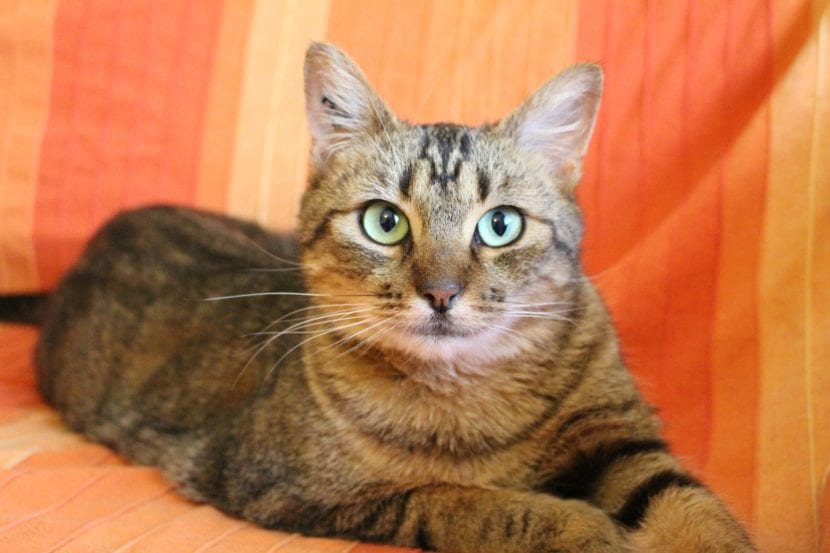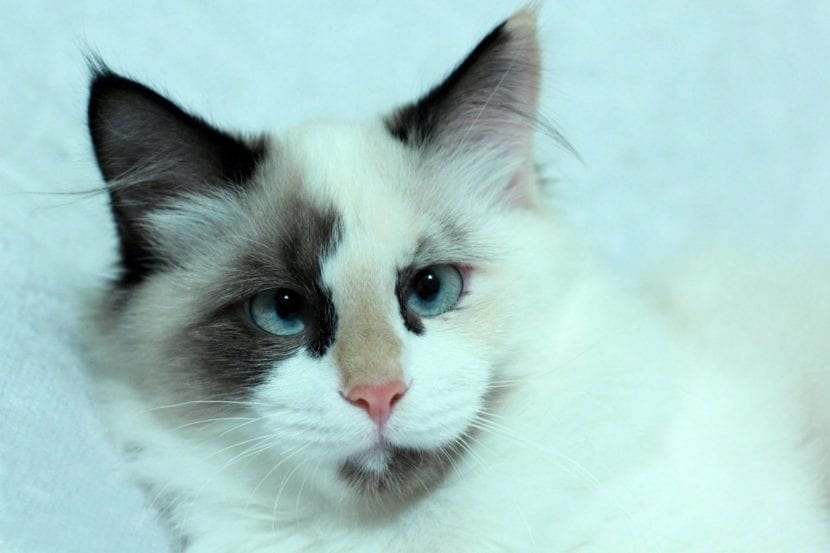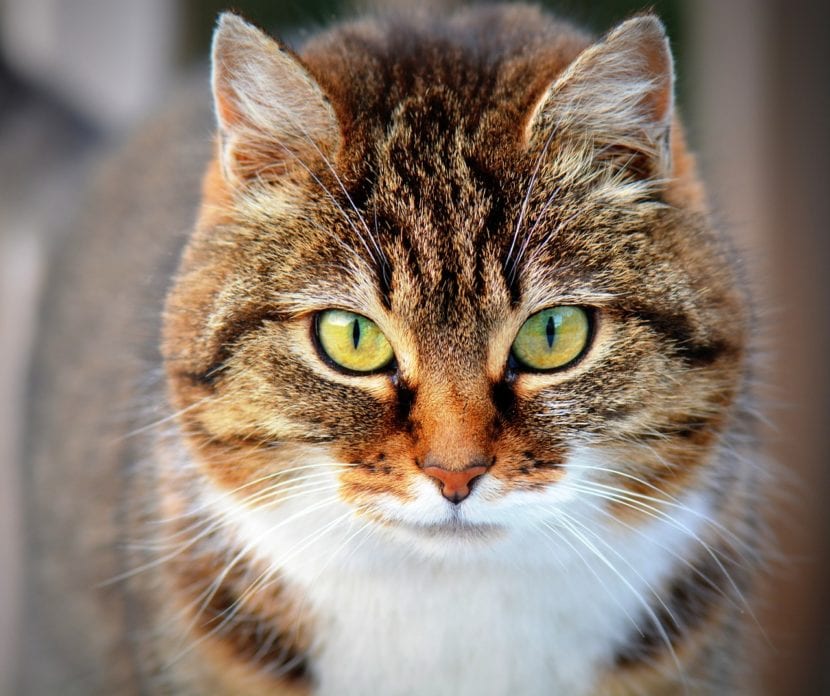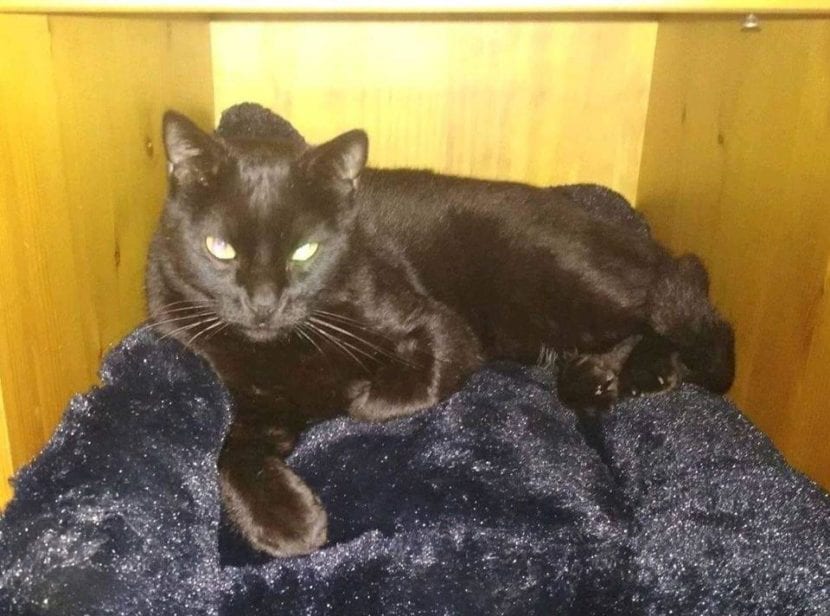
Every day we use various products that are poisonous to the cat, such as the dishwasher or bleach. Thus, it is very important to always have them saved to prevent you from approaching to lick it. Now, this is not enough, because if there are drops left without drying the animal could step on them and, when it is cleaned, it will become intoxicated.
To avoid scares, or if you are already in the situation, I will explain what to do if a cat drinks bleach.
What are the symptoms of bleach poisoning in cats?

The symptom Most common bleach poisoning in cats are the following:
- Hair whitening around the mouth
- Vomiting
- Excessive drooling
- Sore throat
- Abdominal pain
- Trouble breathing
- Nausea
- Cough
Depending on the amount, the symptoms will be more or less intense. In any case, if he vomits, it is highly recommended to collect a sample to take to the vet in case you doubt whether he has drunk bleach or something else. But, if you are sure that you have been poisoned by ingesting this product, then you should do the following.
What do I do if my cat has drunk bleach?
Bleach is a product that can cause internal burns, so we do not have to induce vomiting. However, It is advisable that we give him to drink water so that he can expel it with the urine. Of course, without forcing him. No matter how nervous and worried we are, we should never force him to drink, as it could be worse.
Another thing we must do is wash and rinse thoroughly with a specific shampoo for cats to remove any residue that may have remained on its skin or hair in a warm room, so that we can ensure that the animal does not get cold.
Once first aid is given, especially if he does not improve, we have to urgently take him to the vet.
How long does it take for a poisoned cat to recover?

The answer it will depend a lot on the type of poison you have ingested and how quickly it has been detected. If we talk about the fact that he has drunk bleach and we find him a few minutes after the event, from when we take him to the vet until he fully recovers, only a few days will pass; But if we find it already bad, lying down and / or with breathing problems, the first 48 hours are very critical, and if it exceeds them, there may be some sequelae (such as discomfort when swallowing, or in the abdomen) for life .
How long does it take for the poison to take effect on a cat?
It depends on the type of poison and how much you have taken. The more corrosive it is and the more you have eaten, the faster it will cause symptoms. It can be hours or days. For example, one of the cats that live in the garden began to feel very ill the day after I put an antiparasitic pipette on all of them.
Apparently this cat must have reached the liquid (which has to be put on the part of the neck, the one that joins the head with the back, right in the center), and her body overreacted. I took her to the vet, and after an X-ray we saw that she had fluid in her lungs, which was why she was having trouble breathing normally (in fact, she was panting) and walking.
After a few days of drug treatment, and having her at home for a week, he managed to recover.
And we are talking about a flea pipette for cats, not bleach or rodenticide or anything else. So, You have to be very careful to leave according to what is within the reach of the animals, since the symptoms of poisoning can appear up to several days later.
What does a cat feel when it is poisoned?
When symptoms appear, what you feel is much pain. Depending on what poison you have ingested (or have been made to ingest, which is another topic that we are not going to talk about here, but which would be good for a book considering the little or no respect that some people have for cats), you will notice the following:
- Leg paralysis
- Unable to meow due to lack of oxygen
- Muscles contract and harden
- Throat may close
Differences between death from poisoning and death from being run over

My cat Benji, passed away on March 30, 2019.
On March 30, 2019, one of my chocolates, Benji, who is almost five years old, passed away. He was always a semi-feral cat, and he adored freedom. Since we live in an area of the town where there are several lots and few dangers, I have always let him out. But the truth is that now I cannot say that I do not regret it.
Benji was a heaven, a beautiful panther, independent yes, but very affectionate. It was a very special cat that I found that Saturday lying in the street, lifeless. At first I thought I had been poisoned, as I had a lot of dry saliva on my body, but after a few weeks I spoke to a veterinarian and she told me the following:
- No poison acts in a few minutes (I had gone out to look for him 20 minutes before, and then I came back and was already totally stiff).
- There are no poisons that cause the animal to expel blood.
Therefore, their theory is that Benji suffered a trauma to the thorax, caused by a vehicle, accidentally because he did not have a fracture apparently.
And for this reason, I did not want to end this post without adding this last section, in case one day (I hope not, because that would mean that your feline is no longer with you) it could be of any use to you.
How to prevent my cat from ingesting bleach or other toxic products?
Simply, not leaving them within reach. But beware, this will not be enough. If we use bleach to wash the floor for example, the ideal would be to stop doing it and replace the bleach with a natural scrubber. In addition, all the furniture should be thoroughly dried once clean, in order to remove any drops.
The cat is an animal that, if it steps on an area where there is precisely a small droplet, it will notice it and immediately lick itself, with the consequent risk that its body reacts and begins to feel bad.
Any precaution is little when it comes to potentially dangerous products for cats. The ideal, I insist, is not to have any in the home, since they are also toxic to humans.
Indeed, whenever I mop (usually with a mop that contains bleach and detergent), I think that if they step on the wet floor then they will lick their feet, but I foolishly think that once dry it will no longer have an effect even if they step on it. I have to correct that, and look for a floor cleaner that does not contain bleach, but natural, natural ... I don't know if they exist.
The problem with my older cat is that I have also SOMETIMES CAUGHT HIM TRYING TO DRINK WATER FROM THE SCRUBBING BUCKET, and I think SOMETIMES HE IS ABLE TO DO IT For this reason I have wondered if there will be buckets with lids, although I never saw them.
And yes, yesterday I saw a huge vomit that I assumed was his; nothing solid, but patés give a runny vomit, if they are not "bumpy." The fact is that he is a little more inactive than usual, and none of the craving to eat that he always shows. Although the bleach is mixed with water and detergent, I suppose it has done him some harm, but aside from a certain apathy, the guy does not seem affected in anything substantial. Probably vomiting what he ingested, has freed him from the bleach passing from his stomach.
What I did not know is that NO POISON PRODUCES BLEEDING, rather I have heard the opposite, that there is blood leakage through the orifices of the body (??). I take care of colony cats and whenever I see a dead one "in sight", I think of a run over because, certainly, poisoning is never instantaneous, and in that case they have time to hide to die. Also an accident that is not a fatal trauma may not be instantaneous, and give you time to hide to die. In short, as a dead cat is almost never necropsied on the street (unless you convince the police to do so, but you pay the cost), the cause of the deaths of stray cats is totally deductive. The indications given by this veterinarian shed a little more light on research that is rarely done. It has been very useful.